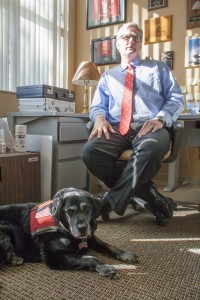When Michael Rutledge stepped onto a college campus for the first time, he was not a traditional first-year student. He joined the Army at 19 and was arriving at a university at 42.
His entire adult life had been in the service of his country. One day he was part of a regimented world and suddenly the freshman was facing endless possibilities. Luckily he had his beloved companion, Onyx, by his side.
“She provided me a great deal of comfort for the first couple of years,” Rutledge said.
Rutledge is now the Veteran Resource Representative at NMU. Onyx is his beloved friend. The two first met April 12, 2004 when she was 3 years old.
In addition to her service as a post-traumatic stress dog, Onyx is trained to sense seizures and provide assistance if Rutledge were to suffer from a fall due to his vertigo, something he said hasn’t been an issue for 11 years now.
“Fortunately she never had to perform her functions for the seizure sensing,” Rutledge said. “I’ve fallen from vertigo but never unconscious or anything. Just for the therapy, it was immeasurable.”
In her younger days, Onyx would go through annual recertification training, Rutledge said. As his condition improved, the need for her work was less of a concern. Now retired, she serves her companionship in a less official role.
“She’ll never take her eye off of me though,” Rutledge said.
Service dogs begin training at a number of different ages, depending on their assignment. Guide dogs or canines aiding those who have suffered from severe mobility disabilities will start training and screening from birth, Rutledge said.
This is quite different from an emotional support animal, who can start training at a much more advanced age.
The difference stems from the services provided, in addition to what the Americans with Disabilities Act provides.
“You have to have paperwork, and people can’t ask you for it,” Rutledge said. “You can only ask if the animal is a service dog and what kind of service they provide.”
There are a significant number of students on campus who have requested emotional support animals, though fewer service dogs, NMU’s Counseling Center Director Ed Michaels said.
“The bar is set much higher than how they would benefit,” Michaels said. “What we are talking about is more significant.”
Those who think a service dog would help them can visit organization websites like America’s Vet Dogs, St. Francis Service Dogs or Stiggy’s Dogs. Then the process would begin with a physician. A dog could be available for those with a visible disability as well as those suffering from mental disabilities, Rutledge said.
“PTSD can affect [veterans] in many different ways,” Rutledge said.
Rutledge became an advocate in part to share with other veterans the benefits a service animal could provide.
If it helps to have a dog to be their connection to the world, to aid in their re-integration back into civilian life, a veteran should utilize the resource. It shouldn’t be something that’s looked upon badly, he said.
“I wouldn’t want to see someone who needs that kind of help denied it because of misinformation,” Rutledge said.























